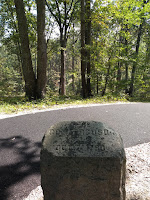Revenge could not wait, smallpox or not. Captain Robert
Harrison was a dangerous menace to all Patriots. He would be found bedridden by
a scouting party on October 14, 1780 near the Antioch community in Kershaw County.
Before the fall of Charleston, the Harrison brothers lived in a run-down log cabin near the Lynches River, east of Bishopville, SC. They slept on animal skins strewn about the floor. Near the sandy roadway, by a Ferry crossing, they lived with the pungent smell of dead fish and stagnant water.(1)

Then Charleston fell to the British and the Red-coats made their way inland towards Camden and Cheraw. With the Continental army in disarray, all was working out well for the King’s men. Camden was occupied, and the fortifications were continually improved around the camp. Those seeking protection from the Empire were urged to come in and get it.
Before the fall of Charleston, the Harrison brothers lived in a run-down log cabin near the Lynches River, east of Bishopville, SC. They slept on animal skins strewn about the floor. Near the sandy roadway, by a Ferry crossing, they lived with the pungent smell of dead fish and stagnant water.(1)

Then Charleston fell to the British and the Red-coats made their way inland towards Camden and Cheraw. With the Continental army in disarray, all was working out well for the King’s men. Camden was occupied, and the fortifications were continually improved around the camp. Those seeking protection from the Empire were urged to come in and get it.
But the summer heat and mosquitoes took their toll on the
troops and Cornwallis was faced with a serious problem of keeping an army in
the field. If he did not act soon, all the gains would be for naught. The
rebels would recognize a weakness and make trouble for those who had already pledged
loyalty to the King. (2)
An opportunity was recognized by the Harrison men. The more
enterprising of the brothers, John, convinced Lord Cornwallis that it would be a
good idea to give him and two of his siblings (Robert and Samuel) commissions
in the army. They would raise upwards of
500 men as a corps of Loyalist Rangers and help defeat the rebels.
Thus, they began their campaign of legal murder and robbery
throughout the PeeDee area under the British command of Major James Wemyss. Burning homes and plantations, they quickly
became hated by their neighbors and known as bandits. Even British Major “Bloody Tarleton” would
refer to them as “men of fortune” instead of soldiers. (3)
A week after the Patriot victory at King’s Mountain, Captain Robert Harrison was found bedridden in
a house off present-day SC Hwy 34. He was a victim of smallpox and yet another
statistic of medical infirmities that plagued the British soldiers in camp. Quarantined
away from the troops until his blistered body succumbed to the viral disease or
beat it back, he was helpless and ostracized.
The band of rebels, bolstered by the success of their
compatriots in the upstate, kicked in the door to the house and found him. Not willing to take a chance on the disease
doing their bidding, they killed him where he lay.
By the end of the war, Samuel would be dead as well.
John, on the other hand, retired as a Colonel in east
Florida with the wealth he had taken from his years of murder and robbery under
the King’s commission.
Freedom Reigns!
Freedom Reigns!
(1) Parker’s Guide to the Revolutionary War in South Carolina, John C. Parker Jr.
(2) The British Soldier in America, Sylvia
Frey
(3) www.suzanneadair.net/2014/07/08/the-winning-of-the-revolution-in-south-carolina/







